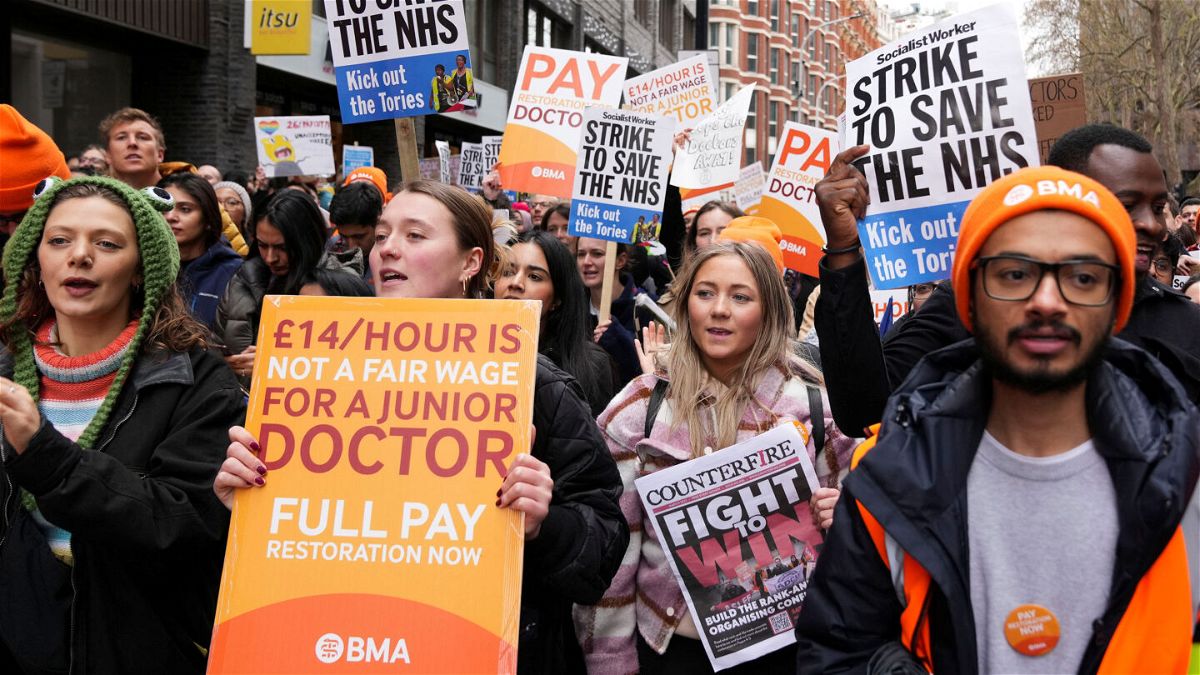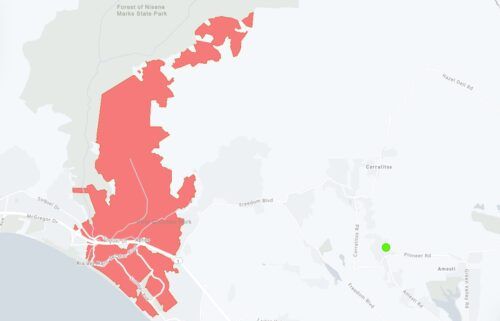Some of England’s trainee doctors are paid less than fast-food workers. They’ve had enough

Tens of thousands of England's trainee doctors have gone on strike this week over pay. For many
By Anna Cooban, CNN
Tens of thousands of England’s trainee doctors have gone on strike this week over pay. For many, hourly pay falls below that of some baristas and fast-food workers.
Junior doctors working in the country’s National Health Service (NHS) walked out Tuesday — the first of four days of strikes — demanding a 35% increase in annual salaries.
The British Medical Association, the trade union and professional body for UK doctors, says junior doctors in England have suffered a 26% cut to their pay since 2008 once inflation is taken into account.
Junior doctors in Scotland, Northern Ireland and Wales are on a different contract to those in England, though they have seen similar real-term cuts to their pay. They are not currently on strike.
“For too long we have been undervalued,” Vivek Trivedi, co-chair of the BMA junior doctors committee, told a crowd of striking doctors Tuesday. “We have reached the end of our tether. The government has pushed us to our limits.”
The UK Department for Health and Social Care, which sets doctors’ pay, did not respond to CNN’s request for comment.
Junior doctors in the United Kingdom are qualified physicians with a five-year medical degree under their belts. They are roughly equivalent to doctors in the United States completing their residencies, who diagnose and treat patients under the supervision of a senior doctor.
It is difficult to compare the salaries of UK junior doctors with those of their international peers, said Lucina Rolewicz, a researcher at Nuffield Trust, a healthcare think-tank. That’s because “the nature of training varies hugely across countries,” she told CNN.
In England, a junior doctor can expect to make £29,384 ($36,795) in their first year of work if working full-time with no extra shifts, according to the BMA. That works out at less than £2,000 ($2,502) a month in take-home pay, when factoring in taxes and typical student loan repayments. Salaries increase as junior doctors spend more years in post-college training, which can last up to eight years
Junior doctors are not adequately compensated either for their high workloads and rigorous training or the life-saving responsibilities they often undertake, the BMA argues.
The union provided an example in a tweet Tuesday: For a typical hour-long surgery to remove a patient’s appendix, three junior doctors in England with between one and 10 years’ experience can expect to earn a combined £66.55 ($83.22) an hour. The doctor in their first year of post-college training would receive just £14.09 ($17.62) an hour, the BMA said.
That’s less than the pay for some jobs with notoriously low wages. For example, the average restaurant manager at Subway or Taco Bell in the United States earns an hourly wage of $18.03 (£14.41) and $18.29 (£14.62) respectively, according to jobs website Indeed.com.
A first-year junior doctor’s pay also falls slightly below the £14.10 ($17.63) an hour that some baristas at popular UK coffee chain Pret A Manager can expect to receive, once a discretionary bonus is included.
‘Unreasonable’ demands
UK health minister Steve Barclay said in a tweet Wednesday that he had hoped to start “meaningful negotiations” with the BMA in March.
Barclay called the union’s call for a 35% pay rise for junior doctors “unreasonable,” adding that he would resume talks if the BMA moved “significantly” away from its current demand.
And finance minister Jeremy Hunt told the BBC Thursday that offering pay rises above the rate of inflation would be a “terrible mistake.”
“The worst possible thing that we can do for junior doctors, nurses, train drivers, teachers is to manage the economy in a way that they are still worried about 10% cost of living increases, in a year’s time,” he said in Washington, D.C.
A BMA spokesperson told CNN Friday that the union was still “happy to enter talks with the UK government at any time.”
“Even during this week’s industrial action in England [we] have offered to call off strikes if [Barclay] brings a credible offer to the table — something he continues to refuse to do,” the union said in a statement.
The NHS Confederation, which represents NHS healthcare providers, estimates that up to 350,000 appointments and operations have been canceled as a result of this week’s strike action. Junior doctors make up nearly 40% of England’s NHS doctors, according to the confederation.
“The full impact will not be known straight away. NHS staff are doing all they can to minimize disruption,” Matthew Taylor, the confederation’s chief executive, said in a statement.
There is also some dispute over the pay numbers.
The BMA has calculated the 26% drop in real pay for its junior doctors using the Retail Prices Index, an older measure of inflation that the UK statistics agency says likely overstates the price rises.
Using the government’s preferred measure of inflation, the Consumer Prices Index, the Nuffield Trust calculates that typical salaries for England’s junior doctors fell 7.9% in real terms between 2010 and 2022.
‘A real struggle’
Whatever the measure, rising prices are eating into doctors’ paychecks. They are not alone: Hundreds of thousands of UK workers, from nurses to rail staff, have gone on strike since last summer to demand pay rises in line with soaring inflation.
UK consumer prices jumped 10.4% in February year-over-year, not far off the 41-year high of 11.1% reached in October.
But NHS junior doctors have been squeezed for well over a decade, says former radiologist Tania King-Mohammad.
Back in 2010, King-Mohammad started as a junior doctor in a London hospital, an experience she described to CNN as “very, very stressful.”
“It was a real struggle,” she said. “I got into even more debt — not just my student debt — because I was living and working in London. … It meant that I was using credit cards and going into debt because I couldn’t meet my living costs.”
The 38-year-old said she took less than £2,000 ($2,502) home a month, despite working full-time and doing extra shifts on weekends.
King-Mohammad eventually quit her job as a senior doctor in the NHS in 2021 because the long hours were “not sustainable,” she said. She now works as a property and wealth strategist in Spain.
“[Junior doctors’] pay is not reflective of their education, dedication and commitment,” King-Mohammad said.
Scotland’s junior doctors are currently voting on whether to strike over similar pay grievances. In Wales, the BMA said it was engaged in pay talks with the Welsh government. The BMA’s Northern Ireland branch told CNN that it was currently gauging the appetite for strikes among its junior doctors.
The-CNN-Wire
™ & © 2023 Cable News Network, Inc., a Warner Bros. Discovery Company. All rights reserved.



